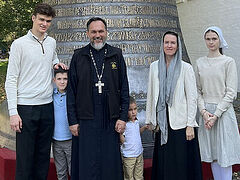Part 1/1: Let us Fast in Earnest
Part 1/2: The Meaning and Significance of Fasting
Part 1/3: Accustoming Ourselves to Fasting
Part 1/4: Spiritual Fasting
Part 2/1: On Prayer. What is Prayer?
St. Dmitry of Rostov teaches:
Prayer is the turning of the mind and thoughts to God. To pray means to stand before God with your mind and steadily gaze upon Him with your thought, and converse with Him with reverent fear and hope. Thus, if you want to pray, gather all your thoughts, lay aside all external, earthly cares, and present your mind to God and gaze upon Him.
It follows from this that before you begin to pray and read your prayer rule, stand a little, or walk a bit—sober up your mind, distancing it from all earthly affairs and objects, and think: Who are you—who is desiring to pray, and who is He to Whom you want to pray? And arouse a corresponding disposition of self-abasement and a sense of standing before God penetrated with reverent awe in your soul. For this, you have to envision as vividly as possible the boundless greatness of the eternal, omnipotent, omnipresent, and all-seeing God, for Whom Heaven is His throne and Earth His footstool—envision as vividly as though He were standing before you, looking at you, and listening to you.
God revealed His name to Moses—the ever-existing and living One, and Moses fell down before Him in great fear and trembling. God said to Abraham: “I am God almighty, always and everywhere existing; walk before me and be blameless,” and Abraham confessed himself as dust and ashes before Him. Venerable Isaiah beheld the Lord on the throne high and exalted, surrounded by archangels and angels, in unapproachable light, and confessed himself an accursed sinner. King David was so attuned that he saw God on his right hand, and he called himself a worm, not a man. These are examples of how to envision God and attune yourself when preparing for prayer!
Then, preparing yourself for prayer, you need to: a) clear your conscience of all impure and sinful thoughts; b) gather yourself and concentrate all your thoughts on God; c) especially eliminate all enmity towards your neighbor, envy, and malice. Prayer itself must be said not otherwise than in the name of the Lord Jesus Christ, with undoubting faith and hope of receiving what you entreat, with deep humility, from a sincere disposition.
We must know that the subject of our prayers should be what is pleasing to God and holy, such as: glorifying the name of God, our salvation and that of our neighbors, and from among temporal goods, only what is essentially necessary for us and our neighbors. Moreover, we must be constant in prayer, even if sometimes we don’t receive what we ask for a long time. Finally, also know that standing before an icon and making prostrations is not prayer, but only an accessory of prayer; reciting prayers from memory, or from a book, or listening to them is not yet prayer, but only an instrument of prayer, or a means of discovering and arousing it. Prayer itself is, as we have said, the emergence of reverent feelings towards God in our heart one after another: self-abasement, devotion, gratitude, praise, supplication, contrition, submission to the will of God, zealously falling before Him, and others. With these thoughts and feelings, begin your prayers.
Amen.







